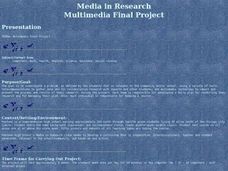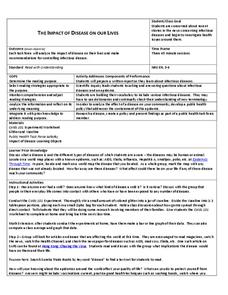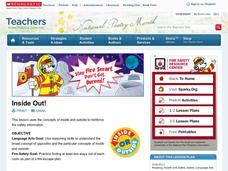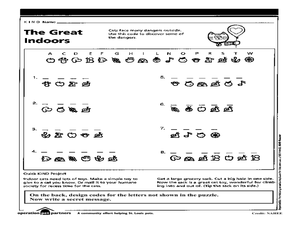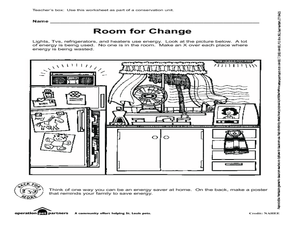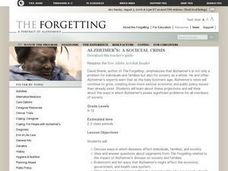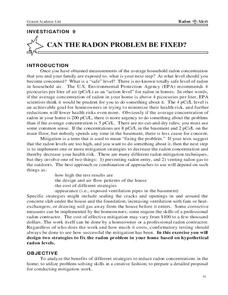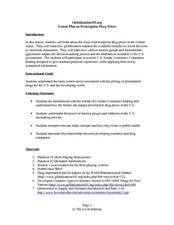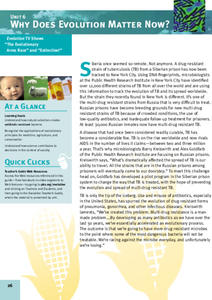Curated OER
Project Helping Hands
Middle schoolers work as a team to help improve the quality of life in rural Africa and develop a plan how to spend grant money the United Nations has provided them with.
Curated OER
Feelings, Nothing More Than Feelings (Elementary, other)
Third graders describe emotions/ feelings which may lead to loss of self-control, introduce the concept of consequences and alternative choices.
Curated OER
Government Spending - Earmarks
In this government spending - earmarks worksheet, students research this topic (there are many links listed), examine the issue, write a letter to their congressional representative or a local newspaper, make a video or analyze the...
Curated OER
Traffic signs and signals
Students understand and follow directions based on traffic signs. In this traffic signs lesson plan, students play the game red light green light and are asked why they stop and go according to the colors. They then are introduced to the...
Curated OER
Media in Research Multimedia Final Project
Students work cooperatively in groups to research a topic of their choice. They create a multimedia presentation of the information researched. Throughout the project they generate their own progress journals.
Curated OER
Save the Earth: It's Everyone's Home!
Students demonstrate how to make earth-smart choices. In this environmental awareness lesson, students listen to a short lecture on environmentally friendly products. Students invent an environmentally friendly product and complete an...
Curated OER
The Impact of Disease on Our Lives
Students write a report about infectious diseases where they demonstrate their understanding of new terminology. In this writing lesson plan, students analyze the effect of disease in their lives and and make scientific inquiry about the...
Curated OER
Aqueduct Architecture: Moving Water to the Masses in Ancient Rome
Ninth graders compare ancient and modern technology in water transporting. In this instructional activity on the evolution of the aqueduct, 9th graders build a working aqueduct model and examine its components. They explain the...
Curated OER
Edgar Allan Poe: an Author Unit
Eighth graders study the life and writing of Edgar Allan Poe in this unit of work.
Curated OER
Germs: Learning Not to Share
Young scholars have cinnamon sprinkled onto their hands and walk around the room touching objects within their reach. Students observe all of the objects containing cinnamon fingerprints to visualize where and how germs are spread.
Curated OER
Body and Blood
Students explore the cardiovascular system. Through the use of video, students observe the heart pumping an oxygen-enriched blood supply through arteries to the muscles in use during exercise. They participate in activities to explore...
Curated OER
Inside Out!
Students use reasoning skills to understand the concepts of opposites, inside, and outside. In this early childhood lesson plan, students identify words that are opposites, particularly inside and outside. Students then apply their...
Facing History and Ourselves
How Do Rules and Traditions Shape Communities?
Sixth graders explore the concepts of laws and customs in a community, examining the reasoning behind rules. Then then collaborate to write their own classroom code of conduct.
Curated OER
Fabulous Felines: Keeping Cats Safe
Students discover ways to protect their pets. For this animal safety lesson, students role-play as pet "safety officers" and discuss how to make sure cats avoid dangers in the home. Students complete many pet safety worksheets and...
Curated OER
Safety With animals
Students recognize that they need to take appropriate steps when approached by an unfamiliar animal. In this dog lesson, students identify reasons not to approach an unfamiliar dog. Students learn the steps to take if a dog approaches...
Curated OER
Save the Earth, it's Everyone's Home!
Young scholars examine trash for items to recycle and reuse. In this trash lesson plan, students explore how people in the community can use recycled and reused items as they play a recycling game.
Curated OER
Taking a Closer Look (Critical Viewing)
Students explore persuasive writing in advertisements. In this advertisements lesson, students evaluate tobacco advertisements for persuasion techniques. Students then create a counter advertisement against smoking.
Curated OER
Alzheimer's: A Societal Crisis
Students discuss ways in which diseases affect individuals, families, and society, and view and answer questions about segments from The Forgetting related to the impact of Alzheimer's disease on society and families. They brainstorm...
Curated OER
Can The Radon Problem Be Fixed?
In this radon worksheet, students analyze their homes to identify sources of radon in their homes. They determine the best mitigation strategy to be used to reduce the radon and they discuss the advantages and disadvantages of each. They...
Curated OER
Breaking News English: World Toilets
In this world toilets worksheet, students read the article, answer true and false questions, complete synonym matching, complete phrase matching, complete a gap fill, answer short answer questions, answer discussion questions, write, and...
Curated OER
Globalization: Prescription Drug Prices
Students take a closer look at prescription drug prices in the United States and around the world. In this global issues lesson, students investigate health care costs, consider the impact of global prescription agreements, and...
Curated OER
Risk Taking Behaviors
Tenth graders listen to a presenters introduction and write questions they hope to have answered during the presentation. They listen to a presentation and record notes. They participate in small group discussion and complete...
Curated OER
Government Policy and Its Impact on HIV/AIDS
Students examine "President Bush's Emergency Plan for AIDS Relief", identify important U.S. policy events related to AIDS/HIV from the last 25 years and hold a policy debate on the funding for AIDS/HIV programs.
Curated OER
Why Does Evolution Matter Now?
Students examine how natural selection creates antibiotic-resistant bacteria,
recognize applications of evolutionary principles for medicine, agriculture, and conservation, and discuss how science contributes to decisions in context of...






